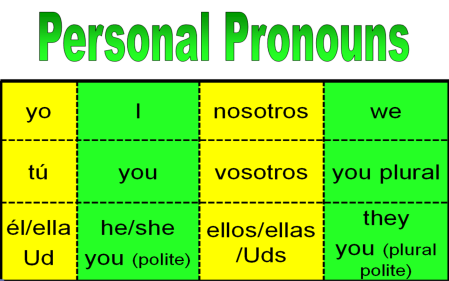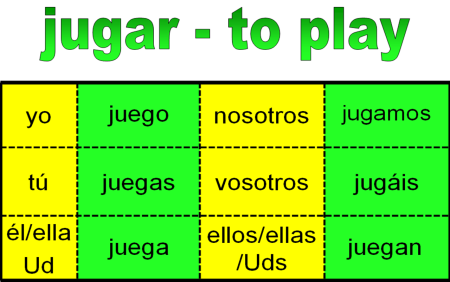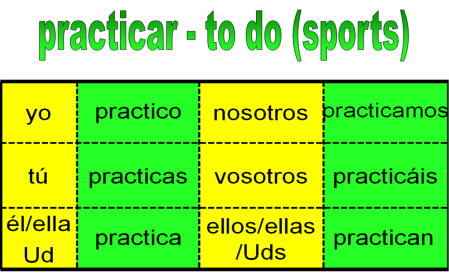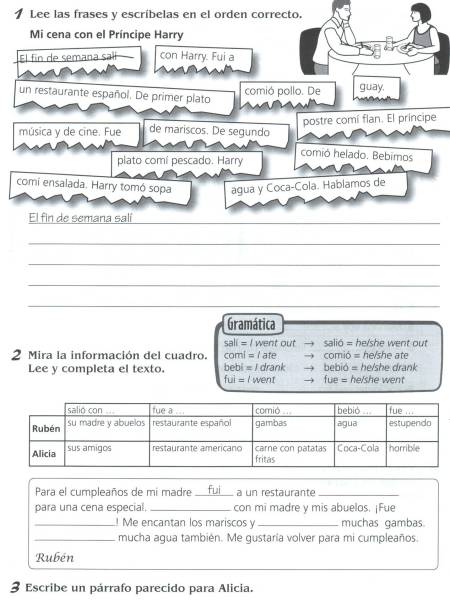Archive for the ‘grammar’ Category
May 6, 2011
The summer assessments will cover the following topics:
Travel and transport
Holiday activities
Countries
Places (in town / compass points)
You will also need to revise the past and future tense.
Use the following links to help you revise:
www.linguascope.com – beginner – el tiempo, los paises, el transporte, en la ciudad
www.languagesonline.org.uk – spanish – caminos 2 – unidad 1, unidad 8
www.espanol-extra.co.uk – core – weather, countries, holidays, language and grammar (the preterite)
www.vocabexpress.com – mis vacaciones (all the topics in that folder)
Below is your speaking and writing assessment to prepare for after half-term:
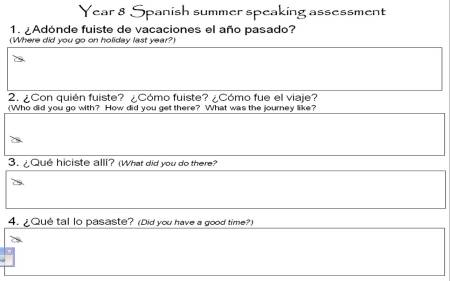
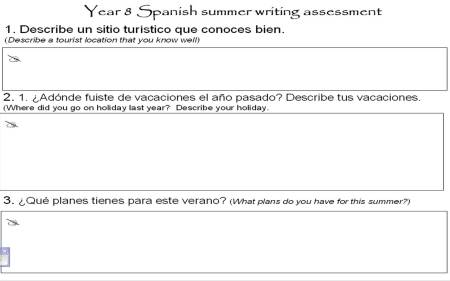
Tags:exam revision, grammar, holidays, homework, y8 spanish
Posted in grammar, holidays, homework, past tense, practice exercises, verbs, writing | Leave a Comment »
December 3, 2010
The assessments next week will cover the topics of:
– describing what people look like
– describing people’s personalities
– comparing people
– sports and hobbies
– future tense and opinions
– food and drink
Use the following links to revise:
www.linguascope.com – beginner – las pasatiempos / los deportes / las frutas / las verduras / desayuno / los snacks
www.languagesonline.org.uk – caminos 1 – unidad 7 (nueva edicion) / unidad 8 / unidad 11 (nueva edicion) / unidad 12 /
Below is your speaking test, make sure that you know answers to the questions off by heart. Go back through your exercise books to help you find the answers. Remember to get level 5 you must use:
– opinions
– accurate verb endings
– future tense
– a variety of vocabulary

Tags:food and drink, homework, sports, writing and speaking exams, y8 spanish, year 8
Posted in adjectives, comparatives and superlatives, food and drink, homework, sports and leisure | 2 Comments »
October 12, 2010
Don’t forget to choose a photo of your own or download one from the web and write a description in Spanish about it (approx. 100 words). Below are some phrases that you might want to use:
Se llama ………. – He / She / It is called ………….
Tiene ……..años – He / She / It is ……………. years old
Es ……..y ……..y tiene el pelo …… y …….. – – He / She / It is …… and ……….. and has ……….. and ………… hair
Es …………. pero muy …………….. – He / She / It is …………… but very ………………
Tiene ……………… – He / She / It has …….(family / pets)
Vive en …………… – He / She / It lives in …………..
Trabaja en ………. – He / She / It works in ……………..
Le gusta …………… – He / She / It likes ……………….
No le gusta ………… – He / She / It doesn’t like …………………
Tags:adjectives, homework, writing, y8 spanish, year 8, year 8. adjectives
Posted in adjectives, homework, writing | Leave a Comment »
September 25, 2010
Read the information about Venus and Serena Williams below and then complete the sentences 1-5 with the name of the correct sister! Once you have done this, you need to translate each sentence into English. Any problems, send me a comment or come to see me in ML7.

Tags:adjectives, comparatives, comparatives and superlatives, homework, reading, spanish, writing, y8 spanish
Posted in adjectives, comparatives and superlatives, homework | 6 Comments »
January 8, 2010
The past tense can be quite complicated in Spanish. The preterite is the simple past tense and is used to talk about things we did in the past. The endings of the verbs change differently to how they do in the present tense. Look at the table below to find the endings for regular verbs in the preterite.

Unfortunately, not all verbs are regular in Spanish, below are 4 irregular verbs that are used often. You have to learn these off by heart as there is no pattern.
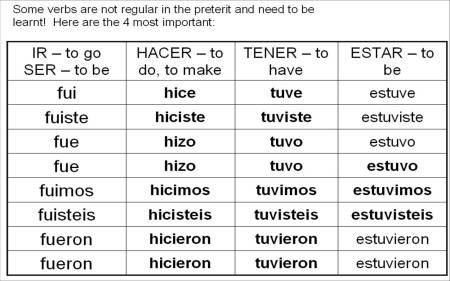
Tags:grammar, past tense, preterito, y8 spanish
Posted in grammar, past tense, verbs | Leave a Comment »
November 25, 2009
You can use the verb ‘soler’ instead of saying ‘normalmente’ or ‘generalmente’ – it means that you tend to do something, but remember to include another verb in the infinitive to make a full sentence.
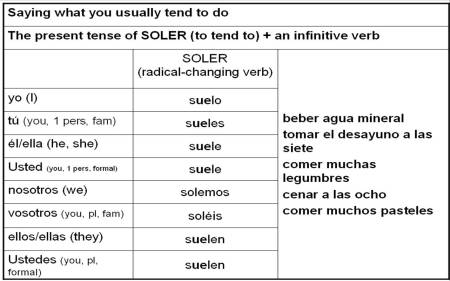
Tags:grammar, soler, spanish, verbs, year 8
Posted in grammar, verbs | Leave a Comment »
September 24, 2009
A comparative adjective is used when we want to compare two things. In English we either add ‘-er’ to the adjective or use ‘more / less ….. than …‘ :
e.g. tall = taller, beautiful = more beautiful
In Spanish the ‘-er’ form does not exist and we only use the ‘more / less …… than …….‘ way of comparing things. Look at the examples below:

Now try to translate the following sentences into Spanish. Click on the thumbnail to check your answers:


Tags:adjectives, comparatives, describing people, spanish, year 8
Posted in adjectives, comparatives and superlatives, grammar, practice exercises, writing | Leave a Comment »



